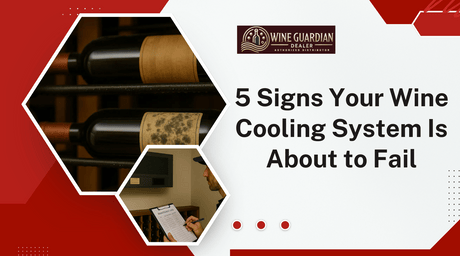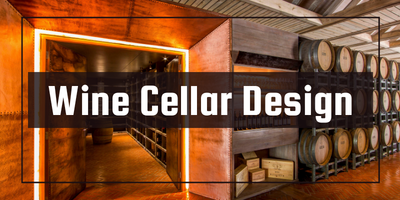
5 Signs Your Wine Cooling System Is About to Fail
Don’t wait for a costly surprise. Wine Guardian Dealer breaks down the top 5 signs your wine cooling system may be failing — and how to fix it before damage...
Jim Hopper
In Stock & Ready to Ship – Order Your Wine Cooling System Today!
Free Wine Cellar Expert Consultation | 📞 Call 1-800-260-1712
Start with a free expert consult—cooling system sizing, racking options, and no upsells.

Build your dream wine cellar—without costly mistakes or guesswork.
By Jim Hopper, Wine Cooling Expert

Ducted wine cellar cooling systems are one of the best ways to keep your wine perfectly chilled—without the noise or the bulk of a unit sitting in the room.
But let’s be real: installing one can feel a little overwhelming if you’ve never done it before.
That’s why we put together this simple, step-by-step guide. Whether you’re a homeowner looking to understand the process, or a contractor preparing for your next job, this post will walk you through:
Let’s dive in! For full planning help and system recommendations, check out our complete Wine Cellar Design and Installation: Build a Beautiful, Functional Wine Room That Lasts.
A cellar cooling system is a specialized air conditioner designed to maintain a consistent temperature and humidity level in your wine cellar. These systems are crucial for preserving the quality and flavor of your wine, as fluctuations in temperature and humidity can cause significant damage.
At the heart of these systems are three main components: the evaporator coil, the condenser coil, and the compressor. Together, they work to cool the air and remove heat, ensuring your wine is stored at the ideal temperature. You can program the system to operate within a specific temperature range, providing a stable environment essential for aging wine.
Maintaining a consistent temperature and humidity level helps prevent corks from drying out, which can lead to oxidization. In the right environment, your wine will age gracefully, developing the flavors and aromas intended by the winemaker. This makes cellar cooling systems indispensable for serious wine collectors who want to ensure their wine collection is stored under optimal conditions.

A ducted system keeps your wine cellar cool by moving cold air through flexible or rigid ducts—just like a mini HVAC system. The cooling unit itself is installed outside the cellar, which means it houses the evaporator, fans, compressor, condenser, and controls in just a single unit. These advanced cooling units are designed for optimal temperature and humidity control, offering ease of installation and serviceability:
The cold air travels through insulated ducts into the cellar, and warm air is pulled out through a return duct. It’s a great option if you want your wine cellar to look as good as it performs.
✅ Pro Pick:Sentinel Series Ducted Systems from Wine Guardian

Selecting the right cooling unit for your wine cellar is crucial for maintaining optimal storage conditions. The size of your wine cellar, the type of wine you’re storing, and your desired temperature and humidity levels all play a role in determining the best unit for your needs.
First, consider the cooling capacity of the unit. It should be powerful enough to maintain a consistent temperature and humidity level throughout your cellar. Units designed specifically for wine cellars are engineered to provide the ideal environment for wine storage, so look for these specialized options.
Noise level and energy efficiency are also important factors. You want a unit that operates quietly and doesn’t consume excessive energy, balancing performance with cost-effectiveness. Additionally, consider the installation requirements and maintenance needs of the unit to ensure it fits your space and lifestyle.
By choosing the right cooling unit, you can ensure that your wine collection is stored in optimal conditions, preserving its quality and flavor for years to come.
Before starting, you’ll want to gather the right supplies. While every install is a little different, here are the basics:
When choosing the right cooling unit, consider the various types of wine cooling units available. Self-contained units are compact and ideal for smaller spaces, offering precise temperature control and low maintenance. Split system units, on the other hand, provide flexibility in installation and are perfect for larger wine storage needs. Understanding these options will help you select the best wine cooling unit for your specific requirements.
⚠️ Safety note: Always follow local building codes and consult an electrician or HVAC pro for wiring or venting. Reliable power supply is paramount when planning for unit installation.
Here’s a general walkthrough of what the process looks like:
Pick a space outside the wine cellar (like an attic, utility room, or adjacent closet) that’s close enough for duct runs and easy access. Make sure it’s ventilated and has proper clearance around the unit, as proper ventilation is essential for efficient heat dissipation from the cooling unit. Proper ventilation and humidity control are crucial to prevent damage to wine bottles, ensuring the quality of the wine and the integrity of your collection.
Secure the Wine Guardian unit on a platform, wall, or ceiling brackets per the manufacturer’s instructions. Some units can be suspended to save space.
Cut vent openings in your wine cellar wall or ceiling—one for cold air in (supply), one for warm air out (return).
Install the thermostat where it can measure temperature accurately—not directly in the cold air path. Connect it to the unit using low-voltage wire.
Some systems also use remote temperature or humidity sensors. Mount and wire them as directed.
Connect to a power source. Flip the switch, check for airflow, set your desired temperature (usually around 55°F), and make sure the system cycles properly.
Done! 🍷
Even good systems can fail if they’re installed the wrong way. Here’s what to watch out for:
🚫 Kinked or crushed ducts – Restricts airflow
🚫 Poor insulation – Causes energy waste and uneven temps
🚫 Wrong duct size – Always match the unit’s recommendations
🚫 Mounting in a hot attic – Overheats the system
🚫 Skipping a heat load calculation – Leads to the wrong unit choice
🚫 Inadequate insulation – Can lead to increased wear on the cooling system
🛠️ Need help? Call 1 (800) 260-1712 for a free consultation—we’ll make sure you get the right unit and the right setup.
Regular maintenance is crucial for the longevity and performance of your cooling system. Start by checking the air filter regularly and replacing it as needed to ensure proper airflow. Clean the condenser coils to maintain efficient heat transfer, and check the refrigerant levels to ensure the system is cooling effectively.
Inspect the ductwork to make sure it’s properly insulated and sealed, preventing any loss of cool air. Scheduling regular maintenance with a professional can help catch potential issues early and keep your system running efficiently.
By performing regular maintenance, you can ensure that your cooling system continues to provide optimal storage conditions for your wine collection, preserving its quality and flavor over time.
Ducted wine cellar cooling systems give you powerful, quiet, and invisible climate control—perfect for large or luxury cellars. Maintaining a balance of temperature and humidity is critical for properly storing and aging wine. Just make sure it’s installed the right way.
👉 Shop Wine Guardian Cooling Systems
Check out our Sentinel Series for ducted units that blend design and performance.
📞 Call 1 (800) 260-1712 for a FREE consultation
We’ll help you size, select, and install the perfect system for your space—no guesswork required.
You can, but it depends on your experience. If you're handy with HVAC and electrical work, it's doable. But for most people, hiring a pro ensures better results and fewer headaches.
In some areas, yes—especially if electrical or ductwork is involved. Always check with your local building department.
A professional install usually takes 1–2 days, depending on the space and complexity.
Yes, but be sure it’s insulated and properly supported to avoid temperature loss or moisture issues.
🛒Shop our most-loved Wine Guardian cooling systems today.
🛠️Protect your wine with the most trusted systems on the market.
❤️Tested, reviewed, and loved by serious collectors like you.